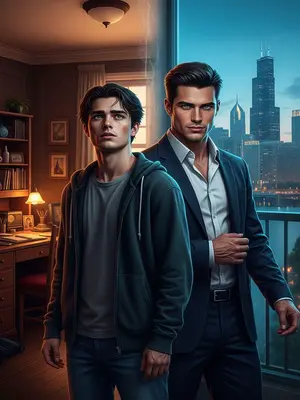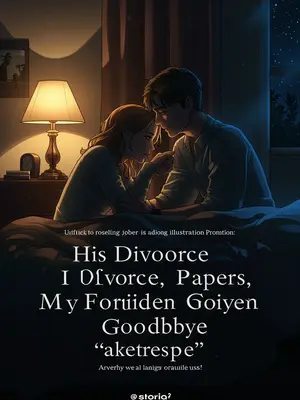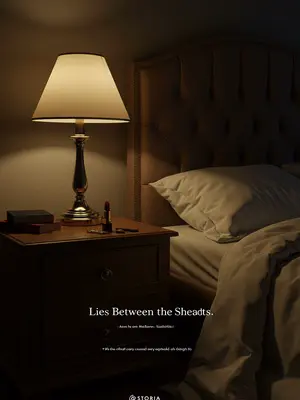Chapter 4: Secrets, Scars, and Rival Smiles
Long time? It’s our first meeting.
I blink, confused, but he just grins, like he knows something I don’t.
To help me fit in, Aunt Lisa handed me off to Carter.
She made it clear—he’s responsible for me now. It’s a little embarrassing, but I’m grateful for the help.
So wherever Carter goes, he’s forced to take me along.
He doesn’t complain, but I can tell he’s not thrilled about it. Still, he keeps his promise to his mom.
Honestly, at first I was scared of him. I barely said a word.
I stuck to the edges of the group, hoping no one would notice me. Carter never pushed, just let me be.
Everyone says he’s tough. There are rumors about Carter everywhere, even on the campus app.
Some say he got suspended for fighting. Others claim he once hacked the school’s grading system. I don’t know what’s true, but the stories make him seem larger than life.
But slowly, I realized he’s surprisingly patient with me.
He never makes fun of my awkwardness. He never rushes me to speak. It’s kind of a relief.
When I eat something I don’t like, he’ll reach out from his game without hesitation. “If you don’t like it, spit it out.”
He says it so matter-of-factly, like it’s no big deal. I hesitate, embarrassed, but he just waits, patient as ever.
I look at his long, slender fingers, but refuse to spit it out.
It feels childish, but I just can’t do it. Carter just shrugs, not making a big deal out of it.
Carter laughs, exasperated. “What? I don’t care, but you do? Spit it out.”
His tone is light, almost playful. He pours me a glass of water, sliding it across the table.
Then he quietly pours me a glass of water.
It’s a small gesture, but it means more than he knows. I take a sip, grateful for the kindness.
He looks out for me, even knows my habits.
He remembers how I like my coffee, knows I hate onions, and always makes sure I’m comfortable before bringing me into a crowd.
When there are a lot of people, Carter will always ask if I’m okay before bringing me over.
It’s his way of looking out for me, even if he pretends not to care. I appreciate it, even if I never say it out loud.
Slowly, I’ve become a bit braver around him.
I find myself speaking up more, even laughing at his jokes. It feels good to be seen, to be included.
See? I even dare to say no to him now.
It’s a small victory, but it feels huge. For the first time in a long time, I feel like I belong.
Carter narrows his eyes. “When did you and Caleb get so close?”
His tone is casual, but there’s something else there—jealousy, maybe, or concern. I can’t tell.
I explain softly, “I just didn’t know how to play the game today, so I felt awkward. But if it’s something else I can do, and Caleb needs help, should I say no too?”
I bite my lip, unsure if I’m asking the right question. Carter’s expression doesn’t change, but I can tell he’s thinking it over.
Carter doesn’t take his eyes off me. “Of course you should. You think I don’t know what he’s after?”
His words are blunt, but there’s a protectiveness there. I wonder if he’s right about Caleb, but I don’t want to believe it.
“Why should I refuse Caleb? Isn’t he your friend?”
It seems logical to me—if Carter trusts him, shouldn’t I?
Carter’s gaze turns serious. “Friend? For some things, he and I aren’t really friends.”
His tone is cold, and I realize there’s more to their relationship than I thought.
But Caleb is nice to me.
He’s always been friendly, never pushy. I want to believe he’s genuine.
He told me, as long as I’m in Maple Heights, if anyone messes with me, I can go to him and he’ll have my back.
It’s a comforting promise. I’ve actually taken him up on it once or twice—he’s never let me down.
Maybe because Carter introduced me, from day one, Caleb has looked out for me.
He treats me like a little sister, always making sure I’m included. It feels good to have someone in my corner.
He doesn’t even raise his voice in front of me.
He’s gentle, careful not to scare me off. I appreciate the effort, even if I’m still wary.
After a long silence, I pout, get out of the car, and say to Carter, “I won’t. You’re crazy—I’m not listening to you.”
My words are defiant, but there’s a smile on my lips. For once, I feel brave enough to push back.
Carter is stunned for a second, then laughs, shaking his head.
His laughter is warm, genuine. It’s the first time I’ve seen him truly relax around me.
But seeing me hop out so fast, he instinctively reaches out to steady my arm.
His touch is steady, grounding. I stumble, but he catches me before I can fall.
“Easy there, troublemaker.”
His words are teasing, but there’s affection in his voice. I smile, feeling a little more at home.
Now that everyone knows there’s a girl hanging out with Carter, they’re all curious about me.
I can feel their eyes on me wherever I go. It’s strange, being the center of attention for once.
To be able to hang out together, their families must all be pretty impressive.
It’s an unspoken rule—if you’re in this group, your last name matters. I’m still learning the hierarchy, but I’m starting to find my place.
But because of Carter, everyone treats me with respect.
No one dares mess with me, not when Carter’s around. It’s a strange kind of protection, but I’m grateful for it.
Madison and her little sidekick are the only ones openly cold to me.
Their glances are sharp, their words edged with sarcasm. I try not to let it bother me, but it’s hard.
Most people don’t realize it, but since I’ve been deaf since I was a kid, I’m super sensitive to people’s emotions.
I pick up on the smallest cues—a glance, a sigh, the way someone’s shoulders tense. It’s my way of navigating the world.
That’s right, I can’t hear—but I wasn’t born this way.
It happened when I was little, and it changed everything. I’ve learned to adapt, but it’s never been easy.
When I was little, a babysitter wasn’t paying attention and I got a fever. It led to ear inflammation.
My parents were at work, trusting someone else to watch me. By the time they got home, I was burning up, crying in my crib.
By the time my parents rushed me to the hospital, I was already deaf.
The doctors did what they could, but the damage was done. My world went silent overnight.
After a bunch of failed treatments, I got a cochlear implant.
The surgery was scary, but my parents were hopeful. They wanted me to have every chance at a normal life.
But even after turning it on, I still couldn’t hear clearly.
The sounds were muffled, distorted. It was nothing like I remembered. I struggled to make sense of the noise.
My head was always buzzing, and I couldn’t say a full sentence.
Speech therapy became my new normal. I spent hours practicing words, trying to make my mouth match the sounds I couldn’t hear.
Back then, I was too young to really get what I’d lost. It only hit me when I realized I couldn’t hear kittens or puppies anymore—I cried for a long, long time.
It broke my heart, realizing I’d lost something so simple. I grieved in my own quiet way, holding onto memories of laughter and music.
Because my speech wasn’t clear, classmates left me out and laughed at me.
School was hard. Kids can be cruel, and I became an easy target. I learned to keep my head down, to avoid drawing attention.
Adults would say I was pretty, but as soon as they found out I couldn’t hear, they’d look at me with pity.
That look—the one that says you’re broken—hurt more than the teasing. I hated it, but I couldn’t escape it.
I couldn’t stand that look. I didn’t want to go to a special school, so as a kid, I started speech therapy every day.
My parents fought for me, insisting I could keep up with everyone else. I worked twice as hard, determined to prove them right.
I went along with all kinds of treatments. Finally, I just needed a hearing aid to live like everyone else.
It was a relief, finally being able to understand conversations, to feel included. But the fear of standing out never really went away.
I worked hard to be normal, worked hard to get into the college I wanted.
Every acceptance letter felt like a victory. I earned my place here, and I’m proud of that.
But I couldn’t hide my insecurity. I’d been bullied for three years.
The scars run deep. Even now, I flinch when someone raises their voice, always bracing for the worst.
During those years, I was timid, withdrawn, and didn’t like to talk.
It became easier to stay silent, to let others speak for me. I lost my confidence, piece by piece.













